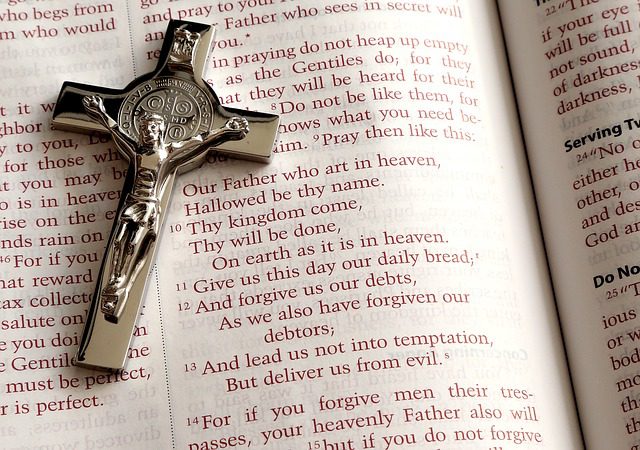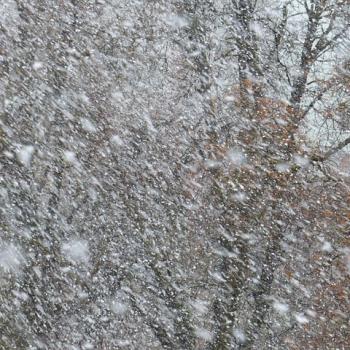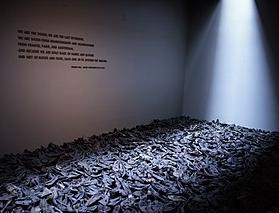
I would like to draw your attention to a lesson and an illustration from that venerable series, the Saint Joseph Baltimore Catechism. I don’t think I have the right to post the image in a Patheos blog, but you can look at where it was posted publicly here.
For those who can’t see, the illustration is of a cute little girl with gray hair and oddly salmon-colored skin in a red dress, who looks sort of like Mary from It’s A Wonderful Life. Mary is making a sad face and saying “It was my fault. I am telling the truth. I am leaving nothing out.” This is to demonstrate how to properly confess your sins: “The chief qualities of a good confession are three: they should be humble, sincere, and entire. NO EXCUSES, NO FALSEHOODS, NO OMISSIONS. Humble, sincere, entire.”
That’s how Catholics are supposed to confess our sins: we’re supposed to be humble, admitting fault instead of looking for others to blame. We’re supposed to be sincere, telling the truth about what we did. We’re supposed to be entire, omitting nothing relevant. Got it?
Good.
Because that is the only way I want to hear my fellow Catholics who are not indigenous talking about the horrendous discoveries of the mass graves on the grounds of the Indian Residential Schools. I don’t have a right to order around the indigenous Catholics; all I can say to you is that I’m humbled by your being able to see Christ in spite of all the sins committed against your culture by colonizers, and I’m so sorry. But for the rest of you: this is how you’re supposed to talk about crimes like the ones we’re seeing uncovered. You’re supposed to confess them humbly, sincerely, and entirely.
The discoveries just keep coming: the remains of hundreds of small children that we already knew were torn from the arms of their parents and deliberately abused in order to destroy every vestige of their culture. Now we know they were also directly killed or neglected to death in huge numbers. These graves are being found at the Canadian residential schools, but you can be certain that, if we ever bother to look, we’ll see the same thing happened at the residential schools in the United States.
The Catholic Church committed these sins. They gladly sent “missionaries” whose job was to receive kidnapped children, torture them into submission, and apparently killed them.
Gaudium Et Spes clearly states: any kind of social or cultural discrimination in basic personal rights on the grounds of sex, race, color, social conditions, language or religion, must be curbed and eradicated as incompatible with God’s design. And the residential schools were designed to discriminate in basic personal rights on those very grounds. That was sin. All the child abuse, the beatings and sexual abuse and other punishments, that the priests and religious at those schools committed in an attempt to eradicate indigenous cultures from the United States and Canada, was sin after sin against the fifth commandment. And, obviously, killing children is the gravest of sins as well. I’d like to see anyone claim it isn’t.
And as if all that weren’t enough, it was a terrible way to preach the Gospel as well. If what we actually wanted were converts to Christianity, we never would have represented Christ in such a traumatizing and abusive manner. Many indigenous people don’t want to hear about Jesus Christ because of our sins. That’s how horrendously we failed Christ on every level. We blasphemed Him by pretending to represent Him while torturing and killing little children. Christ Himself said the punishment for that sin would be something worse than a millstone and the sea. We brought that on ourselves.
We need to confess those sins, humbly, sincerely and entirely.
Don’t try to pin the blame on the Canadian and United States governments. Sure, government and Church worked together, but that’s not the point. This is our time to confess what we did. Confess fault humbly. Listen humbly to the survivors.
Don’t try to waffle about what happened or claim there were good sides too. That’s insincere. Be sincere, admitting how terrible and inexcusable it was.
Don’t act like every effort shouldn’t be made to find out the full extent of the atrocity. Be eager that the entirety of the sin should be known.
Of course that’s just the beginning. We can’t MERELY confess. Remember, as we were all taught in Catechism lessons, we’re supposed to confess our sins, do penance, and amend our lives. There’s probably a salmon-and-red Baltimore Catechism cartoon about that too. And penance for sins this severe is going to be quite the undertaking. I might humbly suggest that, since those priests and religious answered to dioceses and took vows of obedience to religious orders, the orders and dioceses should foot the bill. Dioceses and religious orders seem to have unlimited funding when it comes to hiring lawyers to protect their members from consequences when they are accused of crimes– just look at how nicely “Mister Morrier” was taken care of this April. I think a good start could be made at reparation fairly easily from that source. I don’t know how we’ll get them to cough it up, of course.
And to my indigenous brothers and sisters reading this: I am so, so sorry. I don’t expect you to be satisfied by a “sorry.” I know that saying “sorry” isn’t enough, but I want to say it anyway. I want it to be the beginning of living differently. With the help of the grace of the One Whom Venerable Black Elk called Wanikiya, I firmly resolve to confess my sins, to do penance, and to amend my life.
And of my Church, I demand the same.
Image via Pixabay
Mary Pezzulo is the author of Meditations on the Way of the Cross and Stumbling into Grace: How We Meet God in Tiny Works of Mercy.
Steel Magnificat operates almost entirely on tips. To tip the author, visit our donate page.













